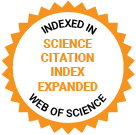Journal of Medical Internet Research
The leading peer-reviewed journal for digital medicine and health and health care in the internet age.
Editor-in-Chief:
Gunther Eysenbach, MD, MPH, FACMI, Founding Editor and Publisher; Adjunct Professor, School of Health Information Science, University of Victoria, Canada
Impact Factor 6.0 CiteScore 11.7
Recent Articles


Although cancer screening is essential for early detection and an improved prognosis, screening beyond the recommended guidelines may increase the risk of false-positive results. Consequently, educating individuals about the potential harm of non–guideline-based cancer screening is essential; however, effective communication methods remain unclear.

Depression affects people’s daily lives and even leads to suicidal behavior. Text-based depression estimation using natural language processing has emerged as a feasible approach for early mental health screening. However, most existing reviews often included studies with weak depression labels, which affected the reliability of the results and further limited the practical application of the automatic depression estimation models.


Best practice standards, in the form of clinical practice guidelines (CPGs) and clinical pathways (CPs), aim to standardize care and improve outcomes. However, variation in clinical practice exists, and not all deviations are inappropriate. Measuring adherence to best practice standards remains challenging due to limitations in representation methods and data fidelity.

European public healthcare systems are expanding eHealth tools such as teleconsultations, online appointment bookings, and electronic health records (EHRs) to improve efficiency and access to healthcare. However, their use depends on factors like digital skills and internet access, which are unequally distributed across socioeconomic and demographic determinants. Most existing evidence on these inequalities are qualitative or outside universal healthcare systems.

Since their introduction with the Digital Care Act in 2019, selected digital health apps (DiGA) are a part of the German statutory healthcare system. In order to become a DiGA, digital health apps have to complete a certification process covering both technical and evidence related aspects. After completion, DiGA are added to the DiGA-directory, containing a list of all reimbursable DiGA within German statutory health insurance (SHI). The first apps were added at the end of 2020 with the number steadily increasing. The novelty of this digital healthcare service and the fast implementation led to problems and barriers to optimal use along the way, which are studied from different stakeholder perspectives in this research article.

The rapid proliferation of electronic devices has increased screen time, raising concerns about its potential health effects, including chronic pain. However, existing studies have limitations in scope and causal inference, with inconsistent findings and a lack of exploration of potential biological mechanisms.

Highly visual social media (HVSM) platforms such as Facebook (Meta Platforms, Inc), Instagram (Meta Platforms, Inc), TikTok (ByteDance Ltd), and Snapchat (Snap Inc) have become central to the digital lives of adolescents and young adults. While these platforms have been linked to body dissatisfaction, they are also increasingly used as vehicles for health promotion. However, the evidence on interventions delivered through HVSM to address body image issues remains fragmented.

Mobile phone ecological momentary assessment (EMA) methods are a well-established measure of eating and drinking behaviors, but compliance can be poor. Micro-EMA (μEMA), which collects information with a single tap response to brief questions on smartwatches, offers a novel application that may improve response rates. To our knowledge, there is no data evaluating μEMA to measure eating habits in children or in low-to-middle-income countries.

Obsessive-Compulsive Disorder (OCD) affects 1–3% of the population and is marked by intrusive obsessions and compulsive behaviors that impair daily functioning. As digital technologies have become ubiquitous, their features may interact with OCD symptom dimensions in ways that both exacerbate and alleviate symptoms. While case reports and clinical anecdotes suggest such interactions, systematic investigation of patients’ lived experiences with technology remains limited.
Preprints Open for Peer Review
Open Peer Review Period:
-
Open Peer Review Period:
-
Open Peer Review Period:
-

















